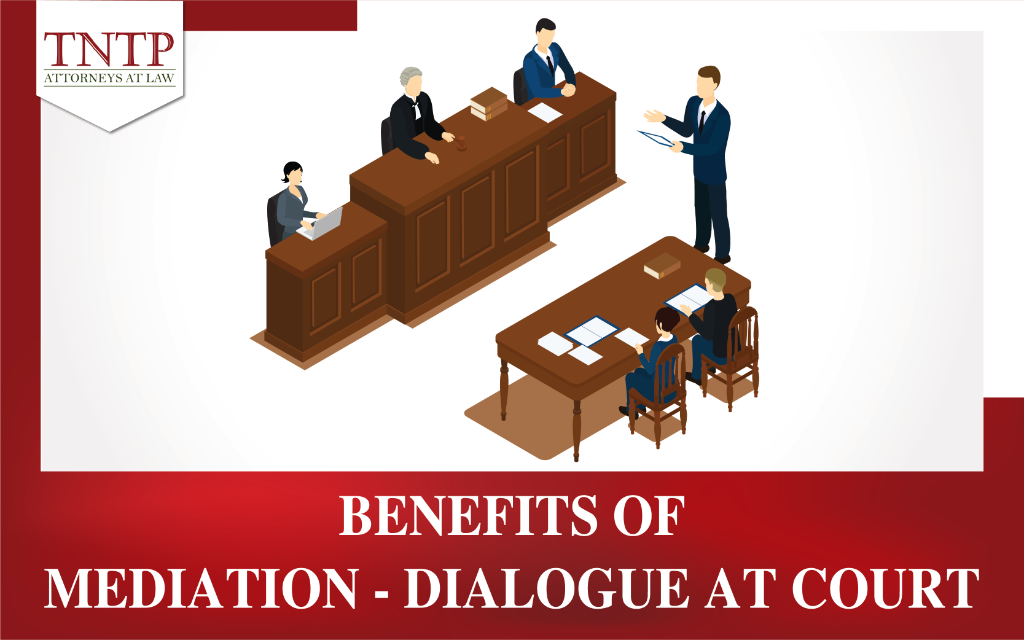Benefits of mediation or dialogue at Court

In the laws of society, disputes are always inevitable. Dispute settlement is of significance to social justice and stability but remains a complex matter. When a dispute takes place, there are many different methods of settlement. Each method has its advantages and disadvantages, and choosing the suitable method can significantly affect the resolution process and the outcome of the case. However, the method of reconciliation and dialogue has not been paid much attention compared to its potential. Therefore, TNTP is sending you an article “Benefits of mediation or dialogue at Court”.
1. Understanding mediation or dialogue in Court
• Mediation at court refers to mediation activity conducted by a Mediator before the court accepts a civil case in order to assist parties in mediation to settle the civil case.
• Dialogue at court means a dialogue conducted by a mediator before the court accepts an administrative case, in order to assist the parties in dialogue to settle the administrative lawsuit.
Thus, mediation or dialogue at Court is an activity carried out by mediators, selected and appointed by the competent Court from reputable experts and experts in the community, meeting the standards specified in Clause 1, Article 10 of the Law on Mediation or Dialogue at Court 2020. This process is intended to resolve cases in which the petitioner has filed an application to the Court, but which the Court has not yet accepted and disposed of according to the proceedings.
2. The benefits of mediation, dialogue in Court
a. Minimize time and effort
• Mediation or dialogue at Court shall be implemented based on the provisions of the Law on Mediation or Dialogue at Court 2020. The name “mediation, dialogue at Court” could be misunderstood as a process in court proceedings, however, in fact, this is a non-litigate mediation procedure.
Therefore, the time of mediation or dialogue will be applied in accordance with the provisions of the Law on Mediation or Dialogue at Court 2020. The average time to resolve a case is about 1.5 months. If the case is agreed by the parties, it will last no more than 02 months. Furthermore, in the process of mediation or dialogue, if the parties cannot find a common voice, they have the right to request the termination of the mediation or dialogue at any time.
• The parties can actively choose the time and place of the mediation session. Unlike court proceedings conducted during office hours, the parties choosing mediation, dialogue can choose the appropriate time, place and method of mediation. This means that mediation can take place inside or outside the Court’s premises, outside office hours, and also by meeting in person or through other means proposed and agreed upon by the parties.
b. Cost-efficient
• The fee for mediation or dialogue shall be guaranteed by the State budget, except in cases such as: major business or commercial disputes; selection of mediation venues outside the court building; review the status of out-of-province property; foreign language translator… Such provisions are intended to encourage the parties to carry out reconciliation and dialogue.
• When the parties choose to settle the dispute in court proceedings, the minimum fee to be incurred is VND 300,000 or more, depending on the type of dispute and the value of the dispute. the higher the value, the higher the court fee will be. Besides, the parties still have to bear other related costs incurred as the law prescribed.
c. High consensus in dispute resolution
• In mediation, the parties involved completely voluntarily reach an agreement on how to resolve the dispute. When mediation is successful, the dispute resolution memorandum reflects the will of all parties, and they are satisfied with the outcome. In other words, in the mediation process, there are no winners or losers, but every party gets what it wants. Therefore, the tension will be reduced and relationships and cooperation between the parties will be preserved.
• Because of the content of the agreement when mediation or dialogue is highly agreed by the parties. Therefore, after mediation, the parties implement the content of mediation voluntarily and quickly.
d. Confidentiality of information of parties
The privacy and self-determination of the parties are central to the process of mediation and dialogue. Information in mediation is strictly confidential, ensuring trust and respect between the parties. All discussions and decisions take place in private, and cannot be recorded or videotaped without the consent of the parties. Minutes are only made to record the final result of the process, and the contents of the record must also be kept confidential. These principles help facilitate the parties to feel comfortable and free to participate, thereby making it easier for the Mediator to effectively guide the parties to the final agreement.
In conclusion, the application of mediation or dialogue in court brings many benefits to the parties and the judicial system. We hope that through this article, readers will have a comprehensive and accurate perspective. From there, you can choose the suitable methods for your case.
Above is the article “Benefits of mediation or dialogue methods at Court” that TNTP sent to readers. In case there is content to discuss, please contact TNTP for support.
Best regards.



